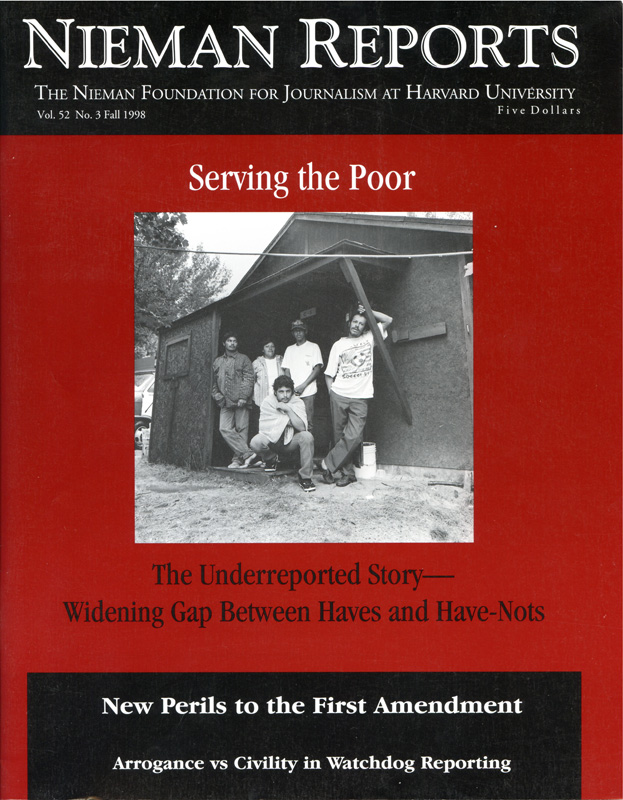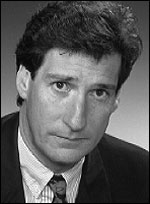The timing could not have been better. Several days after I was asked, as a Nieman Fellow, to write an article on the apparent lack of civility by British journalists, the Local Government Minister, Hilary Armstrong, reacted furiously while being quizzed by a BBC correspondent at a press conference. Describing a question about conflict of interest in the Labor Government’s relationship to a lobbyist who was a former aide to Home Minister Jack Straw as “an outrage,” she stormed out, saying, “It is a slur, it is not true.”
This was mild compared to the blistering letter the Prime Minister’s Press Secretary, Alastair Campbell, wrote to The Times in response to a recent article (“Ministers shun BBC inquisitors for chats on sofas.”) The letter asserted that Government Ministers were not declining the opportunity to face difficult interviews while accepting invitations instead to be questioned by non-hard news variety hosts such as Des O’Connor (ITV prime time, woolly sweaters on a couch with set-piece pre-planned punch lines) or Richard and Judy, (daytime chat show hosts).
Campbell, former Political Editor of Robert Maxwell’s Daily Mirror tabloid, which supported the Labor Party, commented: “These programs are watched by millions of people, many of whom do not follow politics closely.” He continued, “Very few people—in politics or the media—take ‘The World at One’ [BBC Network Radio lunchtime in-depth news program] seriously, so such regular appearances are less likely. ‘Newsnight’ [BBC Network TV program, which airs weekdays nightly from 10:30-11:15 and is watched on an average night by about a million people,] has a dwindling audience.
“As one minister said to me recently when I tried to get him to appear on the program, ‘What is the point of traipsing out to W12 [BBC TV studios in West London] late at night so that Jeremy [Jeremy Paxman, the anchor] can try to persuade the public that I’m actually some kind of criminal?”
In swift response later that day in The Evening Standard, Paxman riposted with an article headlined, “Why the PM’s spokesman is talking crap—that’s C.R.A.P.” (using Campbell’s own words in briefings). In it he said, “It is the journalist’s job to find things that powerful people don’t want to tell us, and the interrogator’s job to test their arguments.” In the United States, the closest approximation would be White House Press Secretary Mike McCurry writing a column in The Washington Post and Ted Koppel answering back in The Chicago Sun-Times. (The Standard is a tabloid but not down-market).
Paxo, as he is referred to occasionally in the press, is one of U.K. journalism’s most tenacious and robust interviewers, frequently mentioned as “a heavyweight rottweiler.” The closest American approximation would be Koppel, but perhaps Paxman’s style of questioning is more persistent and direct. Koppel is certainly more tactful. A notable instance was Paxman’s asking the previous Tory Home Office Minister, Michael Howard, whose portfolio included crime and punishment, the same question over and over again—whether he should have resigned over the escape of prisoners inside Parkhurst, a top level security prison. He repeated the question 14 times while Howard evaded answering.
I ventured into the Lion’s Den—well, the BBC’s new digital multimedia news center in the wasteland of W12, where Jeremy’s demeanor, when he is not facing politicians, often resembles that of a pussycat or golden retriever. Well, a very polite English gentleman of the Public School Oxbridge model.
Paxman denies that he is always on the attack and gently reminded me that he recently got Health Minister Frank Dobson to agree with him without resorting to inquisitorial methods. However, he is adamant that it is entirely legitimate to press for answers because “politicians are like monkeys—they inflict their most unattractive parts on the public.”
It isn’t only BBC’s “Newsnight” that has a tradition of non-polite interviewing—BBC Radio 4’s flagship breakfast program “Today,” which sets the agenda for public discussion, fields a sharp trio of two men and a woman (Jim Naughtie, Sue McGregor and the other noted rottweiler, John Humphreys, who in another classic interview, when a harried cabinet minister accused him of 32 interruptions in 10 minutes, rushed to correct him. It was only five minutes, not 10, he said.)
Even in the less hard news environment of the studios of BBC Radio’s “Woman’s Hour,” Harriet Harman, until recently Social Security Minister, walked out when Jenny Murray, the presenter, speculated that she might be sacked in the reshuffle—although Harman later asserted she was late for a Cabinet meeting.
I ventured to ask whether these broadcast news shows were perhaps part of an elaborate game or just good theater. Paxman countered that “this current Government is excessively obsessed with PR and being ‘on message’—if there is a message. I want to be off it.” He is also increasingly aware of the art of the spin—“the government apparatus has increased its size now to 1,300 people. Information is now tightly controlled.” He strongly feels that “every senior politician now has access to media training. Our job is to prick the bulb. The interviewer must find ways around it.” He also believes that there is now an emerging pattern that because of Labor’s landslide majority, senior politicians are increasingly not available for public scrutiny.
“The justification for our existence as journalists,” Paxman said, “is that we are not afraid to say boo to these people.”
How typical is this attitude throughout the United Kingdom media? What about print? I did not hesitate to raise this issue with Michael White, Political Editor of The Guardian, the liberal national broadsheet owned by a British trust, one of the few papers not owned by a foreign global conglomerate. A former Washington correspondent, White is a favored broadcast pundit on British government issues of the day and is the master of the bon mots.
At the cafeteria favored by the policemen in the House of Commons, Michael dispensed coffee, comment and advice. He agreed there was a clear difference between print and broadcast. Aggressive reporting was less frequent during the interviews for the print press as well as in the finished article itself. In print, there is less pressure in extracting the information within a few minutes. The interview is a process of exchanging information that leads to an article that appears later. For broadcast, especially live programming, “the interview itself is the outcome and the product. Watching it, the questioning is both interview and content.” Occasionally, the exchange itself becomes news—and when the interviewing is interesting, watching it even becomes a form of entertainment.
White believes that how well you know the person dictates your tone and style of interviewing. He gets a lot of his information directly from interviews, government briefings and from what American journalists call their “sources.” He is also adamant that you do not always need to be aggressive to pry the information out. A combination of humor and knowledge also pays dividends.
Britain also has the Lobby system, whereby Alastair Campbell gives off-the-record briefings to a select group of correspondents. It has been controversial and compared to an old boys club. Many journalists (those outside the gilded circle, admittedly) have been critical of its existence. Michael did not think its coziness a problem. He thought that it was “crap that everything has to be on the record—you get less quality of information from stage-managed statements.”
Victor Smart, former Political Editor of The European and Political Correspondent for The Sunday Observer, was in the Lobby for a decade until six months ago, so he can’t be accused of sour grapes. Perhaps he had a more dispassionate view? Our interview (conducted over E-mail) drew this comment—“It has the typical dynamics of a group—leader, followers, new boys etc. I think you would be surprised how matey they are. Campbell has made them more so with his laddish language. It’s a competitive environment but equally cozy for the insiders. In the back of their mind, Lobby journalists are always trying to prove to themselves they haven’t been co-opted by the system. The reality is that they have—that’s why it’s fun…you are (or feel you are) a player…but it is the government which ultimately has the power and the stories.”
However, Smart does make the point that while the Lobby briefings are highly entertaining, “it does descend very occasionally into low blows when real blood is drawn.” To some extent he admits that “the confrontation tends to get somewhat ritual. Toughness and rudeness is allied to the pack instinct in reporters. Certainly in Westminster and I’m sure inside the Beltway, an issue of the day almost always emerges and then there is a tussle. Few reporters hunt alone.” Smart adds, “It makes civility difficult—it’s easier to trade blows as a group. It’s not so personal and stinging remarks don’t hurt so much if rival reporters too are dealing or are being dealt blows, too, on the same subject.”
U.S. reporters have been described as descending into “feeding frenzies.” In London, Smart says, “it’s wolf packs. Perhaps the analogy is apt. Weaker than their prey sometimes, wolves use complex social structures to topple more powerful beasts without getting hurt individually.”
It now seemed the right moment to ask an American in London what he thought. Who better than the Chief of The New York Times Bureau, situated around the corner from Buckingham Palace? Warren Hoge has been an enthusiastic supporter of the British bulldog interviewing tradition and even wrote about it in January 1997. It described the BBC News breakfast radio program “Today” as one in which “the major figures in public life clamor for the chance to appear on the program, even if it means a bracing encounter with aggressive interrogators…. Americans might see their methods as verging on hectoring.”
“The British public would feel betrayed if we didn’t ask tough questions,” Jim Naughtie, one of the anchors, said in the same article.
Hoge, fresh back from Belfast and Liverpool, had this to say about interviewing styles and techniques—“We in the United States are burdened by fake politeness. In D.C., especially, the national media figures to some extent have been corrupted by proximity and closeness.” He thinks there is too much deference bestowed to politicians, and the recipients also expect it.
“Even when there is disagreement on the agenda as in ‘The McLaughlin Show,’ or ‘Crossfire,’ there is no real engagement or debate. It’s professional wrestling. Both sides speak their set piece and are allocated a forum, but it’s a game show and a setup. The statements are not challenged by tough questioning.”
He recalled Prime Minister Tony Blair’s being interrupted brusquely at least five times in a short interview. “The British go for the jugular. They are combative on both sides. Politicians like John Prescott [the Deputy Prime Minister] themselves do not shy away and relish it. U.S. senators would be insulted by the treatment.”
But while Hoge definitely prefers “the tough contrarian approach instead of the United States tendency to fawn,” he is less impressed with the quality and content of the political reporting in U.K. print media. Other than it being “boring” and “clichéd” and “lazy,” he thinks that despite the diversity and range of the media, they are all predictable and follow a party line of sorts.
His assessment of why print is less challenging is that it is due to “the rush for huge profits and intensive competition amongst them all. They all oversell the stories and this is the reason for a bad product.” I raised the point that there were different circumstances, both institutional and cultural, that would make it difficult to tap sources within the British government. A professional cadre of civil servants/officials still exists rather than short-term political appointees who would tend to leak. Those not in the Lobby, the inner circle, do have to rely on the Press Association, which is accredited for Parliament, so that ultimately the government has the power and the stories. This situation, nevertheless, does not seem to have impeded broadcasting.
More significantly, British journalism is hampered by what Michael White says are key disadvantages—“restrictive libel laws and official secrecy. U.S. colleagues are assisted by legal and constitutional protection.”
This advantage has its problems. Jeremy Paxman thinks the reason why U.S. journalism is less robust is that “they have a constitutional role and are a part of the process. We don’t suffer from the canker of self-importance. The media should be outside casting a quizzical and critical eye. Journalism is still a disreputable trade here. I reach for my revolver when I hear about it as a profession. We are not the same as lawyers, doctors and accountants. We should not be regulated.”
A number of things struck me while writing this article. There was agreement by American and British journalists about the provocative style of British broadcast journalists versus the bland and deferential U.S. version. Regarding print, British journalists admired the accuracy and detail of American quality print media, which is better researched and factually reported.
White is also not convinced about the virtues of fact checking, having been used as a source to confirm facts. “They are wonderful diggers of ‘the truth,’ but the United States has narrow parameters and there is an overall liberal consensus. Their facts become universal truths. Facts are absolute and presumed to range from A-B or A-Z. In real life they are usually L—O.” (I told you he was the master of the bon mot.)
One other reason why this is so can be attributed to commercial considerations rather than political history or institutions. It is interesting that Warren Hoge sees print as the less challenging medium in the U.K. because of the need to compete and sell more copies. White reminded me that the U.K., with a population of 57 million and a size roughly equal to Idaho, has 11 national papers, which sell many more copies than the U.S. nationals in a country five times as populous. They are all competing aggressively to win readers from each other. While the BBC’s Political Editor Robin Oakley (ex-Times) is civility incarnate, can it be any coincidence that his colleagues, Paxman and Humphries, the tenacious rottweilers, emanate from public broadcasting?
I would also suggest that the British political culture does reinforce the apparently more combative style. Unlike Capitol Hill, Westminster is adversarial and politicians are trained to thrive on a debating tradition. Until recently, different ideologies also permeated the system. The European view is that in the United States the two major parties are similar, that both are co-opted by special interest groups, thus the emphasis on issues, campaigns and implementation of promises. The British educational system also instills and encourages students to gather facts but thereafter to criticize, analyze, inquire and judge. Or perhaps there is a more prosaic interpretation: We are divided by a common language.
I had never considered myself particularly aggressive but it was enlightening to discover that I was so a year after my Nieman Fellowship at a Thanksgiving dinner in Washington, when I bumped into a non-journalist I had met at another Harvard institution. He didn’t remember my name but remarked, “Oh, you’re the woman who always asked difficult and challenging questions.”
 Jenny Ai-Ling Lo, recently a media consultant, is starting a new job as Commissioning Editor/Executive for the BBC/Open University—where her portfolio includes political science. Lo wrote this article in a personal capacity (she is a 1996 Nieman Fellow) and not as a representative of BBC. She was educated in Malaysia, New Zealand and Britain. Lo was a BBC News and Current Affairs Producer and has covered British and U.S. elections. From January 1992 to June 1995 she was Executive Producer for BBC MPM and had responsibility for joint BBC and Russian broadcasting teams that produced business and political programs throughout the Russian Federation.
Jenny Ai-Ling Lo, recently a media consultant, is starting a new job as Commissioning Editor/Executive for the BBC/Open University—where her portfolio includes political science. Lo wrote this article in a personal capacity (she is a 1996 Nieman Fellow) and not as a representative of BBC. She was educated in Malaysia, New Zealand and Britain. Lo was a BBC News and Current Affairs Producer and has covered British and U.S. elections. From January 1992 to June 1995 she was Executive Producer for BBC MPM and had responsibility for joint BBC and Russian broadcasting teams that produced business and political programs throughout the Russian Federation.
This was mild compared to the blistering letter the Prime Minister’s Press Secretary, Alastair Campbell, wrote to The Times in response to a recent article (“Ministers shun BBC inquisitors for chats on sofas.”) The letter asserted that Government Ministers were not declining the opportunity to face difficult interviews while accepting invitations instead to be questioned by non-hard news variety hosts such as Des O’Connor (ITV prime time, woolly sweaters on a couch with set-piece pre-planned punch lines) or Richard and Judy, (daytime chat show hosts).
Campbell, former Political Editor of Robert Maxwell’s Daily Mirror tabloid, which supported the Labor Party, commented: “These programs are watched by millions of people, many of whom do not follow politics closely.” He continued, “Very few people—in politics or the media—take ‘The World at One’ [BBC Network Radio lunchtime in-depth news program] seriously, so such regular appearances are less likely. ‘Newsnight’ [BBC Network TV program, which airs weekdays nightly from 10:30-11:15 and is watched on an average night by about a million people,] has a dwindling audience.
“As one minister said to me recently when I tried to get him to appear on the program, ‘What is the point of traipsing out to W12 [BBC TV studios in West London] late at night so that Jeremy [Jeremy Paxman, the anchor] can try to persuade the public that I’m actually some kind of criminal?”
In swift response later that day in The Evening Standard, Paxman riposted with an article headlined, “Why the PM’s spokesman is talking crap—that’s C.R.A.P.” (using Campbell’s own words in briefings). In it he said, “It is the journalist’s job to find things that powerful people don’t want to tell us, and the interrogator’s job to test their arguments.” In the United States, the closest approximation would be White House Press Secretary Mike McCurry writing a column in The Washington Post and Ted Koppel answering back in The Chicago Sun-Times. (The Standard is a tabloid but not down-market).
Paxo, as he is referred to occasionally in the press, is one of U.K. journalism’s most tenacious and robust interviewers, frequently mentioned as “a heavyweight rottweiler.” The closest American approximation would be Koppel, but perhaps Paxman’s style of questioning is more persistent and direct. Koppel is certainly more tactful. A notable instance was Paxman’s asking the previous Tory Home Office Minister, Michael Howard, whose portfolio included crime and punishment, the same question over and over again—whether he should have resigned over the escape of prisoners inside Parkhurst, a top level security prison. He repeated the question 14 times while Howard evaded answering.
I ventured into the Lion’s Den—well, the BBC’s new digital multimedia news center in the wasteland of W12, where Jeremy’s demeanor, when he is not facing politicians, often resembles that of a pussycat or golden retriever. Well, a very polite English gentleman of the Public School Oxbridge model.
Paxman denies that he is always on the attack and gently reminded me that he recently got Health Minister Frank Dobson to agree with him without resorting to inquisitorial methods. However, he is adamant that it is entirely legitimate to press for answers because “politicians are like monkeys—they inflict their most unattractive parts on the public.”
It isn’t only BBC’s “Newsnight” that has a tradition of non-polite interviewing—BBC Radio 4’s flagship breakfast program “Today,” which sets the agenda for public discussion, fields a sharp trio of two men and a woman (Jim Naughtie, Sue McGregor and the other noted rottweiler, John Humphreys, who in another classic interview, when a harried cabinet minister accused him of 32 interruptions in 10 minutes, rushed to correct him. It was only five minutes, not 10, he said.)
Even in the less hard news environment of the studios of BBC Radio’s “Woman’s Hour,” Harriet Harman, until recently Social Security Minister, walked out when Jenny Murray, the presenter, speculated that she might be sacked in the reshuffle—although Harman later asserted she was late for a Cabinet meeting.
I ventured to ask whether these broadcast news shows were perhaps part of an elaborate game or just good theater. Paxman countered that “this current Government is excessively obsessed with PR and being ‘on message’—if there is a message. I want to be off it.” He is also increasingly aware of the art of the spin—“the government apparatus has increased its size now to 1,300 people. Information is now tightly controlled.” He strongly feels that “every senior politician now has access to media training. Our job is to prick the bulb. The interviewer must find ways around it.” He also believes that there is now an emerging pattern that because of Labor’s landslide majority, senior politicians are increasingly not available for public scrutiny.
“The justification for our existence as journalists,” Paxman said, “is that we are not afraid to say boo to these people.”
How typical is this attitude throughout the United Kingdom media? What about print? I did not hesitate to raise this issue with Michael White, Political Editor of The Guardian, the liberal national broadsheet owned by a British trust, one of the few papers not owned by a foreign global conglomerate. A former Washington correspondent, White is a favored broadcast pundit on British government issues of the day and is the master of the bon mots.
At the cafeteria favored by the policemen in the House of Commons, Michael dispensed coffee, comment and advice. He agreed there was a clear difference between print and broadcast. Aggressive reporting was less frequent during the interviews for the print press as well as in the finished article itself. In print, there is less pressure in extracting the information within a few minutes. The interview is a process of exchanging information that leads to an article that appears later. For broadcast, especially live programming, “the interview itself is the outcome and the product. Watching it, the questioning is both interview and content.” Occasionally, the exchange itself becomes news—and when the interviewing is interesting, watching it even becomes a form of entertainment.
White believes that how well you know the person dictates your tone and style of interviewing. He gets a lot of his information directly from interviews, government briefings and from what American journalists call their “sources.” He is also adamant that you do not always need to be aggressive to pry the information out. A combination of humor and knowledge also pays dividends.
Britain also has the Lobby system, whereby Alastair Campbell gives off-the-record briefings to a select group of correspondents. It has been controversial and compared to an old boys club. Many journalists (those outside the gilded circle, admittedly) have been critical of its existence. Michael did not think its coziness a problem. He thought that it was “crap that everything has to be on the record—you get less quality of information from stage-managed statements.”
Victor Smart, former Political Editor of The European and Political Correspondent for The Sunday Observer, was in the Lobby for a decade until six months ago, so he can’t be accused of sour grapes. Perhaps he had a more dispassionate view? Our interview (conducted over E-mail) drew this comment—“It has the typical dynamics of a group—leader, followers, new boys etc. I think you would be surprised how matey they are. Campbell has made them more so with his laddish language. It’s a competitive environment but equally cozy for the insiders. In the back of their mind, Lobby journalists are always trying to prove to themselves they haven’t been co-opted by the system. The reality is that they have—that’s why it’s fun…you are (or feel you are) a player…but it is the government which ultimately has the power and the stories.”
However, Smart does make the point that while the Lobby briefings are highly entertaining, “it does descend very occasionally into low blows when real blood is drawn.” To some extent he admits that “the confrontation tends to get somewhat ritual. Toughness and rudeness is allied to the pack instinct in reporters. Certainly in Westminster and I’m sure inside the Beltway, an issue of the day almost always emerges and then there is a tussle. Few reporters hunt alone.” Smart adds, “It makes civility difficult—it’s easier to trade blows as a group. It’s not so personal and stinging remarks don’t hurt so much if rival reporters too are dealing or are being dealt blows, too, on the same subject.”
U.S. reporters have been described as descending into “feeding frenzies.” In London, Smart says, “it’s wolf packs. Perhaps the analogy is apt. Weaker than their prey sometimes, wolves use complex social structures to topple more powerful beasts without getting hurt individually.”
It now seemed the right moment to ask an American in London what he thought. Who better than the Chief of The New York Times Bureau, situated around the corner from Buckingham Palace? Warren Hoge has been an enthusiastic supporter of the British bulldog interviewing tradition and even wrote about it in January 1997. It described the BBC News breakfast radio program “Today” as one in which “the major figures in public life clamor for the chance to appear on the program, even if it means a bracing encounter with aggressive interrogators…. Americans might see their methods as verging on hectoring.”
“The British public would feel betrayed if we didn’t ask tough questions,” Jim Naughtie, one of the anchors, said in the same article.
Hoge, fresh back from Belfast and Liverpool, had this to say about interviewing styles and techniques—“We in the United States are burdened by fake politeness. In D.C., especially, the national media figures to some extent have been corrupted by proximity and closeness.” He thinks there is too much deference bestowed to politicians, and the recipients also expect it.
“Even when there is disagreement on the agenda as in ‘The McLaughlin Show,’ or ‘Crossfire,’ there is no real engagement or debate. It’s professional wrestling. Both sides speak their set piece and are allocated a forum, but it’s a game show and a setup. The statements are not challenged by tough questioning.”
He recalled Prime Minister Tony Blair’s being interrupted brusquely at least five times in a short interview. “The British go for the jugular. They are combative on both sides. Politicians like John Prescott [the Deputy Prime Minister] themselves do not shy away and relish it. U.S. senators would be insulted by the treatment.”
But while Hoge definitely prefers “the tough contrarian approach instead of the United States tendency to fawn,” he is less impressed with the quality and content of the political reporting in U.K. print media. Other than it being “boring” and “clichéd” and “lazy,” he thinks that despite the diversity and range of the media, they are all predictable and follow a party line of sorts.
His assessment of why print is less challenging is that it is due to “the rush for huge profits and intensive competition amongst them all. They all oversell the stories and this is the reason for a bad product.” I raised the point that there were different circumstances, both institutional and cultural, that would make it difficult to tap sources within the British government. A professional cadre of civil servants/officials still exists rather than short-term political appointees who would tend to leak. Those not in the Lobby, the inner circle, do have to rely on the Press Association, which is accredited for Parliament, so that ultimately the government has the power and the stories. This situation, nevertheless, does not seem to have impeded broadcasting.
More significantly, British journalism is hampered by what Michael White says are key disadvantages—“restrictive libel laws and official secrecy. U.S. colleagues are assisted by legal and constitutional protection.”
This advantage has its problems. Jeremy Paxman thinks the reason why U.S. journalism is less robust is that “they have a constitutional role and are a part of the process. We don’t suffer from the canker of self-importance. The media should be outside casting a quizzical and critical eye. Journalism is still a disreputable trade here. I reach for my revolver when I hear about it as a profession. We are not the same as lawyers, doctors and accountants. We should not be regulated.”
A number of things struck me while writing this article. There was agreement by American and British journalists about the provocative style of British broadcast journalists versus the bland and deferential U.S. version. Regarding print, British journalists admired the accuracy and detail of American quality print media, which is better researched and factually reported.
White is also not convinced about the virtues of fact checking, having been used as a source to confirm facts. “They are wonderful diggers of ‘the truth,’ but the United States has narrow parameters and there is an overall liberal consensus. Their facts become universal truths. Facts are absolute and presumed to range from A-B or A-Z. In real life they are usually L—O.” (I told you he was the master of the bon mot.)
One other reason why this is so can be attributed to commercial considerations rather than political history or institutions. It is interesting that Warren Hoge sees print as the less challenging medium in the U.K. because of the need to compete and sell more copies. White reminded me that the U.K., with a population of 57 million and a size roughly equal to Idaho, has 11 national papers, which sell many more copies than the U.S. nationals in a country five times as populous. They are all competing aggressively to win readers from each other. While the BBC’s Political Editor Robin Oakley (ex-Times) is civility incarnate, can it be any coincidence that his colleagues, Paxman and Humphries, the tenacious rottweilers, emanate from public broadcasting?
I would also suggest that the British political culture does reinforce the apparently more combative style. Unlike Capitol Hill, Westminster is adversarial and politicians are trained to thrive on a debating tradition. Until recently, different ideologies also permeated the system. The European view is that in the United States the two major parties are similar, that both are co-opted by special interest groups, thus the emphasis on issues, campaigns and implementation of promises. The British educational system also instills and encourages students to gather facts but thereafter to criticize, analyze, inquire and judge. Or perhaps there is a more prosaic interpretation: We are divided by a common language.
I had never considered myself particularly aggressive but it was enlightening to discover that I was so a year after my Nieman Fellowship at a Thanksgiving dinner in Washington, when I bumped into a non-journalist I had met at another Harvard institution. He didn’t remember my name but remarked, “Oh, you’re the woman who always asked difficult and challenging questions.”
 Jenny Ai-Ling Lo, recently a media consultant, is starting a new job as Commissioning Editor/Executive for the BBC/Open University—where her portfolio includes political science. Lo wrote this article in a personal capacity (she is a 1996 Nieman Fellow) and not as a representative of BBC. She was educated in Malaysia, New Zealand and Britain. Lo was a BBC News and Current Affairs Producer and has covered British and U.S. elections. From January 1992 to June 1995 she was Executive Producer for BBC MPM and had responsibility for joint BBC and Russian broadcasting teams that produced business and political programs throughout the Russian Federation.
Jenny Ai-Ling Lo, recently a media consultant, is starting a new job as Commissioning Editor/Executive for the BBC/Open University—where her portfolio includes political science. Lo wrote this article in a personal capacity (she is a 1996 Nieman Fellow) and not as a representative of BBC. She was educated in Malaysia, New Zealand and Britain. Lo was a BBC News and Current Affairs Producer and has covered British and U.S. elections. From January 1992 to June 1995 she was Executive Producer for BBC MPM and had responsibility for joint BBC and Russian broadcasting teams that produced business and political programs throughout the Russian Federation.






